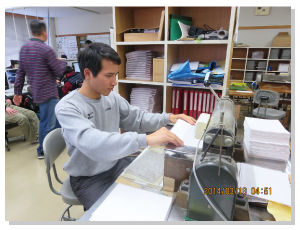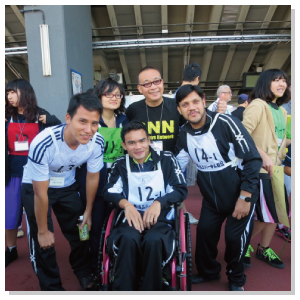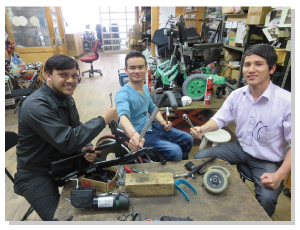- HOME
- Alumni News
- Nguyen Trong Dai (15th trainee)
- Dai's Final Report
Dai's Final Report
A New World, New Experience
Self-introduction & my training objectives
I am Dai from Hanoi, Vietnam. My hobbies are travelling and exploring new things. I also like making friends, and learning and sharing new experiences with them. My favorite quote is, “The more you share, the more you get.” My wish is to become a valuable person in society. I came to Japan with three main purposes. These are the followings:
1. Japanese policies and measures on disability: I wanted to learn and find out about Japanese policies and measures on disability issues, which have assured more rights to persons with disabilities in Japan.
2 Employment of people with disabilities in Japan: in Vietnam, there are 3.6 million persons with disabilities who are unemployed. Therefore, the degree of Independent Living (IL) they can attain is limited. Their standard of living is low. I really wanted to learn about employment of persons with disabilities in Japan. I did so because I wished to modify and adapt the Japanese system to the Vietnam’s working environment, so that I would be able to create opportunity for Vietnamese people with disabilities to work and live independently.
3. How to set up social enterprises: a social enterprise is a new way of running a stable business and I believe that it will become widespread in the near future. I wanted to learn about social enterprises and about jobs for persons with disabilities in order to solve their unemployment issues in Vietnam.
During the 10 months in Japan, I have learnt, studied, and practiced in so many places, and I have met so many people. I felt that Japan is a new world, where I gained a lot of great experience. Below, I will discuss my experience in detail.
Impressive training program and warm-hearted Japanese people
(1) Learning about various jobs which persons with disabilities have
During the individual training I travelled from Tokyo to Kochi prefecture. I visited and studied about jobs for persons with disabilities in numerous centers, organizations, and companies employing persons with disabilities. There are so many types of job and disability business models. For example, people bake bread and cakes at the Hope Center in Kochi and at Life Shonan in Kanagawa. Also, the waiting staff have disabilities at the café in Muso, Handa city, Aichi. In addition, I met some people employed by the wheelchair company, Miki Co., Ltd., in Nagoya, and others working for computer companies, namely Amedia in Tokyo, Hinda company and Wadachi Computer House in Nagoya. Some of those I met through the training were working as staff members, while others were supervising other employees as managers. What I found was that they worked with all their heart and loved their jobs.

(2) Independent Living Centers (CILs) where life experience is shared
In Vietnam, we have only five CILs, in contrast to Japan, where 132 CILs exist. It is necessary to establish more CILs in Vietnam, because there is a strong need for them. Luckily, I had the opportunity to have experience at so many CILs in Japan. I was deeply impressed with CIL AJU, as they had a well-established helper-dispatch system. AJU was established 24 years ago and since then has developed and expanded their range of activities. They activities include the IL program, where people with disabilities learn about Independent Living, and the TRY project – where people march together campaigning for barrier-free facilities and minds. In the latter, AJU cooperates with other CILs across Asia. Their contribution to the disabled community is very significant and meaningful. I feel great to have had experience there.
I also had great time at CIL Partner, in Osaka, for five weeks. I had lots of great moments with everyone there. The overall impression I developed of CILs in Japan is that they love outdoor activities. People with disabilities of different kinds freely go out and take part in social events. I started thinking about the notion of an inclusive society and how to create one. This was the most fruitful learning I gained.
How accessible Japan is
Before coming to Japan, I knew that Japan was famous for technology and social welfare. When I came to Japan, what surprised me most was the accessibility for persons with disabilities. For instance, I saw braille blocks everywhere; I felt there was an enthusiasm to accommodate disability in society.
Technology has effectively improved the lives of those with disabilities. For those with visual impairment, we have reading support devices; and for those with physical impairment, we have a series of assistive devices. Moreover, sign language learning software helps to increase sign language literacy in the country. Technology leads the life of persons with disabilities toward a bright future.
How I have changed
I think I have changed in many ways. My first change is my new Japanese ability. I learnt and practiced very basic Japanese for 3 months. By communicating with Japanese people, my language skills gradually improved day by day.
My second change is seen in my disability support skills. Before coming to Japan, my skills for supporting disabled people were very poor. However, with practice I came to know how to help persons with different types of disabilities. I am very happy about this.
My third change is my sporting skills. In Japan I have had the right and opportunity to participate in so many sports, such as swimming, skiing, wheelchair marathon, blind table tennis, basketball, etc. It made me stronger and happier.

Conclusion and my plans for future
Firstly, I intend to create a disability network. I will contact my colleagues, discuss the situation of people with disabilities in Vietnam, and propose solutions for problems.
Secondly, I want to set up a training program like the Duskin training in Japan. It will be a place where senior citizens with disabilities can share their knowledge and experience developed through their work in the disability field. It will also have some interaction programs like workshops, seminars, and ceremonies. I also want to set up a small business to create jobs for people with disabilities in Vietnam.
Thirdly, I want to join in the disabled community and help to raise our voice about our rights. I also want to create some outdoor activities and support some projects that promote the idea of an inclusive society.
I would like to sincerely thank the Duskin AINOWA Foundation, JSRPD, the leaders for the disabled community, the CILs in Nagoya, Osaka, Kochi, and Kanagawa, my host family, and Toyama Sunrise. Everyone I met during the 10 months has taken good care of me. Thank you very much.





